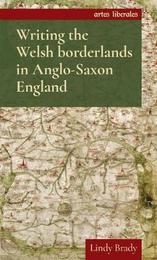
|
Writing the Welsh Borderlands in Anglo-Saxon England
Hardback
Main Details
| Title |
Writing the Welsh Borderlands in Anglo-Saxon England
|
| Authors and Contributors |
By (author) Lindy Brady
|
| Series | Artes Liberales |
|---|
| Physical Properties |
| Format:Hardback | | Pages:216 | | Dimensions(mm): Height 216,Width 138 |
|
| Category/Genre | Literary studies - classical, early and medieval
British and Irish History |
|---|
| ISBN/Barcode |
9781784994198
|
| Classifications | Dewey:942.4 |
|---|
| Audience | |
|---|
| Illustrations |
3 Maps
|
|
Publishing Details |
| Publisher |
Manchester University Press
|
| Imprint |
Manchester University Press
|
| Publication Date |
26 April 2017 |
| Publication Country |
United Kingdom
|
Description
An ambitious book which argues that the March of Wales, as it existed as a legally defined space in the period after 1066, had a long pre-history as a place of encounter and interchange from the early Anglo-Saxon period. It is argued that this frontier space was not inevitably a zone of ethnic conflict, but one where hybrid identities could exist. -- .
Author Biography
Lindy Brady is Assistant Professor in the Department of English at the University of Mississippi -- .
Reviews'In this significant and agenda-setting book, Lindy Brady presents insightful and nuanced readings of the confluent societies that inhabited and created the borderlands of Anglo-Saxon and Welsh history and literature. She offer new and important interpretations of narrative texts, like the Lives of Saint Guthlac, the Vita Haroldi, and The Anglo-Saxon Chronicle, while remaining perceptively attuned to the echoes of social and intellectual realities in the laws and Old English Riddles. Expert at Old English, Welsh and Latin, Brady deftly moves through and between her primary sources to argue coherently for the distinctiveness of the Welsh borderlands as a cultural nexus in the earlier medieval era. This book defines scholarly questions that will inform research in both the pre- and post-Conquest periods in British history for years to come.' Elaine Treharne, Roberta Bowman Denning Professor of Humanities, Stanford University 'Professor Brady's new book offers an elegant and timely study of English-Welsh relations in the early Middle Ages. Effortlessly ranging across genres and time periods, she clearly demonstrates the centrality of the region later known as the "Welsh Marches" to the Anglo-Saxon literary imagination. This is a splendid volume that will appeal to Anglo-Saxonists and Celticists alike.' Andrew Rabin, Professor and Vice Chair, Department of English, University of Louisville 'This is a ground-breaking book, the first real treatment of the early medieval Welsh borderlands as both a historical and literary space. What Lindy Brady shows us, in an immensely scholarly but also very engaging way, is not the world of conflict and violence suggested by Offa's Dyke and later narratives of ethnic warfare but, through her deep reading of a range of texts we think we know well, a world of interaction and co-existence, shared understandings and a unique "Anglo-Welsh culture".' Charles Insley, Senior Lecturer in Medieval History, University of Manchester 'This is an important book for students of early British history and Old English literature. The scholarship is rigorous and extensive, fitting key primary sources into a carefully worked out historical and chronological arrangement to produce some genuinely new interpretations.' Helen Fulton, University of Bristol, The Medieval Review 'This book makes a significant contribution and is likely to be of interest and value to all who study the history of early medieval Britain and in particular the relationship between England and Wales.' David Callander, Journal of the English Place-Name Society, Vol. 50 (2018) 'The book's greatest merit is that it has a big idea, articulated in a series of propositions which are clearly set out. All the arguments are fully supported both by immediate reference to the sources and by deep contextualization. It has fresh readings of familiar material, and fresh constructions of familiar historical episodes, all of them stimulating.' Dr C.P. Lewis, Institute of Historical Research, King's College London, Early Medieval Europe, Vol. 27, Issue 2 'Brady has ably demonstrated the riches that await the researcher in this field. She is to be commended for the clarity with which she presents fresh insights into such diverse and difficult materials. Her work will no doubt provide a welcome beam of light for those who follow in her footsteps.' The English Historical Review 'Through critically informed, historicist readings of representative Old English prose and poetry from the eighth to the twelfth centuries, Brady develops a new picture of a multiethnic, multilingual borderland between England and Wales... Carefully framed within postcolonial and border studies, this study of the Welsh borderlands, both as an ethos and as a discrete geographical region, is essential to our understanding of early English identity and of the deep history of multicultural Britain.' Journal of English and Germanic Philology -- .
|